Comprehensive Guide to Roofing Warranties for Homeowners
August , 2024 | 11 min. read

Thinking about getting a new roof? It's a big decision and a big project. Replacing a roof is one of the biggest jobs you might have to do as a homeowner.
It can feel a bit scary like you're jumping into a vast ocean and you're not sure what to expect. You might even worry about making the wrong choices.
We get it.
At RoofCrafters, we're all about helping homeowners who want to learn more. We want you to know exactly what's going on with your roof project from start to end. An important part of this is picking the right warranty for your roof. A warranty is like a promise that your new roof will be secure for a certain amount of time. It's kind of like insurance for your roof.
In this article, we're going to explain what a roofing warranty is, how long it lasts, and what it covers (and what it doesn't). We'll keep it simple and clear, so you'll have all the info you need to make the best choice for your home. Let's get started!
What Are Roofing Warranties and Why Do You Need Them?
No two warranties are written alike. A roof workmanship warranty works like insurance in that it protects your investment from manufacturer defects and shoddy workmanship. Most roofing systems come with several warranties.
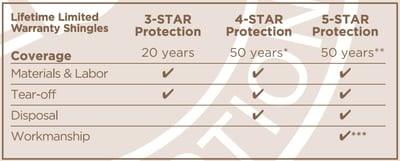
A manufacturer’s warranty typically covers the roofing materials (shingles, metal, tile) and underlayment for 20-50 years. When you purchase a material-only warranty and the materials deteriorate before the warranty is up, the manufacturer would be required to replace them. We recommend that you read the fine print, most material-only roofing warranties are prorated after 5 years. Some offer 10 years depending on the type of materials and manufacturer.

A workmanship warranty covers installation. If your roof springs a leak after it is installed, this usually indicates poor workmanship. A labor-only warranty would require the roofing company to fix any leaks for a specified amount of time after the installation date. However, only a full-system warranty covers both labor and material defects.

A full-system warranty covers things like shingles, underlayment, and flashings, along with other materials used in the installation of a roof. Full-system warranties also cover the cost of repairing leaks, including labor and material. As a result, this type of warranty is more expensive than either material-only or labor-only warranties. Well worth the peace of mind!
How Long Do Roofing Warranties Typically Last?
Great question. It depends on how the warranty is worded. Even if a manufacturer or roofing contractor tells you the warranty lasts for 25, 35, 50 years, or a lifetime, the actual term of coverage can be abridged depending on how the contract is worded.
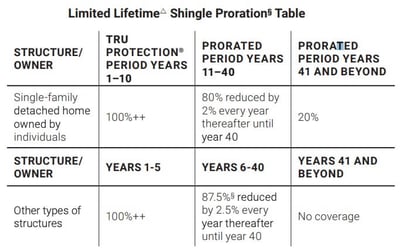
For example, while the bold print may read “30 years” or “lifetime”, the fine print may indicate that the actual warranted value of the roof is reduced by 80% and drops 2% every year. This is from the Owens Corning Warranty.

Other exclusions can include such things as deterioration of underlayment, caulking, and/or flashing. A big one in the fine print is misapplication, if your contractor installs the roof incorrectly, some manufacturers will void the material warranty.
The Real Meaning Behind 'Lifetime' Roofing Warranties
Does anything ever last a lifetime? How does the roofing manufacturer's offer lifetime warranties on asphalt shingles when everyone knows they last on average from 15-20 years?
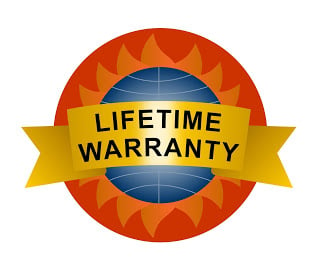
While most asphalt shingles manufactured today come with a "lifetime" warranty. It's only good for as long as you own your home. But you should be aware that most come with a provision that has a specified non-prorated period that typically only lasts 10 years. After that, you’ll be required to pay a portion of the replacement cost that’s determined by the age of the shingles. (This is another reason you need to carefully read the warranty in its entirety.)
Related Article: 5 Reasons Why You Should Read All the Fine Print of Your Roofing Estimate
Understanding Pro-Rated vs. Non-Pro-Rated Roofing Warranties
When it comes to roofing warranties, two key terms you'll often encounter are 'pro-rated' and 'non-pro-rated' coverage. These terms define how the coverage of your roof's warranty changes over time.
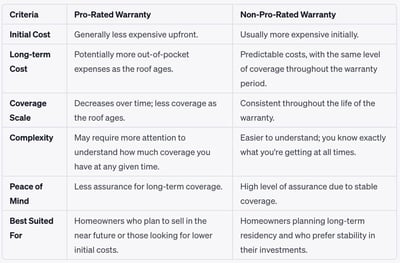
A non-pro-rated warranty offers full coverage for the stated warranty period. The manufacturer will cover the full cost of material defects. They won't deduct for the time the roof has been in service.
A pro-rated warranty reduces the coverage amount as the roof ages. In the initial years, you might receive full coverage. But, as time goes by, the warranty will only pay for a small part of the repair or replacement costs. This is determined by how old your roof was when you made the claim.
Exploring No Dollar Limit (NDL) Roofing Warranties
This type of warranty is only available through the manufacturer. Considered the Cadillac of manufacturers' warranties, it provides the homeowner with the satisfaction of having the manufacturer take full responsibility for the repair or replacement of a defective roof. No matter how much money, materials, or labor it takes to make it right.
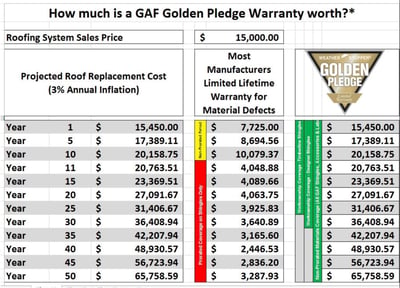
This kind of warranty only covers damage caused by defective material or faulty installation. Not storm damage or any acts of mother nature. It also increases as the years go by, making it more valuable the longer you own the home!
Does Your Roof Warranty Cover Hail and Storm Damage?
Unless it's specified in the manufacturer's materials warranty, the answer is no. However, your homeowner’s policy should cover any damage caused by hail. Unless it is listed as an exclusion. Which some insurance carriers are doing as a way to reduce their liability.
Some roofing manufacturers produce impact-resistant materials that would be covered by the manufacturer if they were damaged during a hail event. If you live in an area prone to hail storms this would be something worth looking into.
Navigating Roof Warranty Transfers: What Homeowners Need to Know
It depends on several things. First, the manufacturer's warranty must state that it is transferable, along with the terms of transfer. This means that a roof can be transferred to the next owner should you sell your home while your roof is still under warranty.

Most manufacturers have time limits on the transfer. (Ex: free transfer within first 10 years) However, transferring may reduce the amount of coverage for the next owner. It also may require you or the new owner to pay a small warranty transfer fee. In most cases $200.00 or less.
Common Exclusions in Roofing Warranties You Should Know
Just as any homeowner’s policy has limitations and exclusions, so do roof warranties. Several things are not covered by or can make a roof shingle warranty null and void.
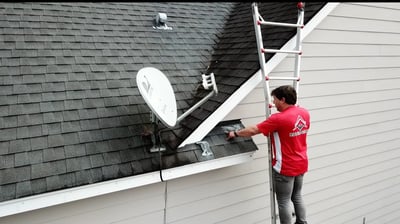
Here is a short list:
- Subsidiary damage to the structure or belongings in your home.
- Damage caused by standing water.
- Acts of God, such as earthquakes, tornadoes, lightning strikes, and storm damage.
- Fire damage
- Unauthorized repairs
- Negligence
- Improper attic ventilation
- Improper roof cleaning
- Improperly installed solar systems and satellite dishes
Are Roof Warranties Worth the Paper They’re Written On?
Only if you purchased a manufacturer's complete roof system warranty. No matter how plan the warranty is worded, it isn’t worth a dime if the roofing company goes bankrupt. That’s why you need to thoroughly research any roofing company before you sign on the dotted line.

Check their reputation and how long they’ve been in business. Ask for references and speak with customers who have had their roofs replaced by any roofer you are considering. Asking for older references or ones that everything didn't go smoothly can prove to be beneficial. You want to know how your contractor will handle problems if they arise.

Avoid companies that have either bad reviews or no reviews, since the latter could indicate a company that is either brand new or one that has changed its name to avoid past liabilities.
Choosing the Best Warranty with the Right Roofing Contractor
For guaranteed protection, hire a roofing contractor who will provide a manufacturer's full system roofing warranty. Which includes both the materials and the workmanship for a stated period. RoofCrafters is a GAF Master Elite and Certainteed Select Shinglemaster. With 30 years under our toolbelts, we are eager to help you get your next roofing project started.
At RoofCrafters, our mission is to provide job opportunities for others to thrive and grow while making a meaningful impact within our communities.



